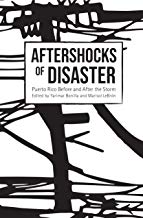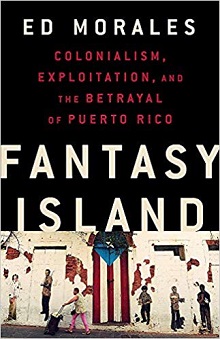Puerto Rico Past and Present | Social Sciences, Sept. 2019
Yarimar Bonilla & Marisol Lebron offer different perspectives. Deibert unpacks the history of colonialism. Ed Morales examines capitalism’s past, present, and future.
 Aftershocks of Disaster: Puerto Rico Before and After the Storm. Haymarket. Sept. 2019. 170p. ed. by Yarimar Bonilla & Marisol Lebron. ISBN 9781642590302. pap. $17. SOC SCI
Aftershocks of Disaster: Puerto Rico Before and After the Storm. Haymarket. Sept. 2019. 170p. ed. by Yarimar Bonilla & Marisol Lebron. ISBN 9781642590302. pap. $17. SOC SCI
Inspired by a 2018 conference at Rutgers University, this title features a series of essays, poems, critiques, interviews, and art centered on Puerto Rico and the aftermath of 2017’s catastrophic Hurricane Maria. Written from many different perspectives, the collection shows that this disaster laid bare other cumulative negative effects that have affected the archipelago throughout its history: from its colonial status to its recent debt and economic crises to its politics and the aftereffects of disaster capitalism. Each essay shows the impact of Maria through various interpretations, which gives a broad spectrum of reactions, from first-person accounts through plays, interviews, and poems to the journalistic narratives of the debt crisis and community-based relief initiatives. VERDICT That many of the authors expand on the topic of Maria to include historical background as well as future speculations and possible solutions adds an extra dimension that enhances the book’s relevancy. For specialists, academic libraries, and those interested in a broader and deeper understanding of the impact of Maria on Puerto Rico.—Laura Hiatt, Fort Collins, CO
D eibert, Michael. When the Sky Fell: Hurricane Maria and the United States in Puerto Rico. Apollo. Sept. 2019. 216p. ISBN 9781948062367. $24.99. HIST
eibert, Michael. When the Sky Fell: Hurricane Maria and the United States in Puerto Rico. Apollo. Sept. 2019. 216p. ISBN 9781948062367. $24.99. HIST
Following the disastrous aftermath of Hurricane Maria in Puerto Rico, journalist Deibert traveled to the islands to investigate the controversial, and underwhelming, aid efforts by the U.S. government. His account of the weeks and months following September 2017, when the hurricane hit, accompany a thoroughly researched history of Puerto Rico, both presented with the goal of helping readers better understand the ongoing impact of colonialism, and how the U.S. mainland responded to the hurricane’s impact. Deibert begins by explaining the first European colonization led by Christopher Columbus. He then journeys through the region’s complex shifts in power, revolutions, and natural disasters. This historical background takes up a significant portion of the book, with the final chapters touching on the relationship between the mainland and Puerto Rico, as it relates to the federal response to the hurricane. VERDICT Recommended for teen and adult readers interested in Puerto Rican history and the effects of colonialism, which continue to impact the present day.—Monique Martinez, Univ. of North Georgia Lib., Dahlonega
 Morales, Ed. Fantasy Island: Colonialism, Exploitation, and the Betrayal of Puerto Rico. Hachette. Sept. 2019. 352p. photos. notes. index. ISBN 9781568588995. $28. HIST
Morales, Ed. Fantasy Island: Colonialism, Exploitation, and the Betrayal of Puerto Rico. Hachette. Sept. 2019. 352p. photos. notes. index. ISBN 9781568588995. $28. HIST
The unincorporated U.S. territory of Puerto Rico is a political, economic, and social conundrum. Or, as Morales (Living in Spanglish) argues in his new nonfiction epic on the archipelago—it’s a fantasy. This work is ambitious, intimidating, and beautiful. With detailed historical research, well-supported arguments, and the occasional sparkling anecdote, the author deconstructs Puerto Rico’s legacy as "the oldest colony." Yet a colony’s history cannot be understood without examining its colonizer, and detailing the rapidly changing situation on the islands, Morales glimpses a bellwether for what is to come if neoliberalism is left to run its course. His investigation dives into the policies that positioned the area to churn out wealth for foreign investment while leaving very little to support its own infrastructures and people. By getting granular with the facts of this "dispossession," Morales does an outstanding job of illustrating how the "racialized logic of capitalism" works—and doesn’t—on the islands. VERDICT This book will be particularly important to readers with a connection to Puerto Rico and useful and thought-provoking to anyone else seeking to understand capitalism’s past, present, and future.—Sierra Dickey, Ctr. for New Americans, Northampton, MA
RELATED
ALREADY A SUBSCRIBER? LOG IN
We are currently offering this content for free. Sign up now to activate your personal profile, where you can save articles for future viewing









Add Comment :-
Comment Policy:
Comment should not be empty !!!